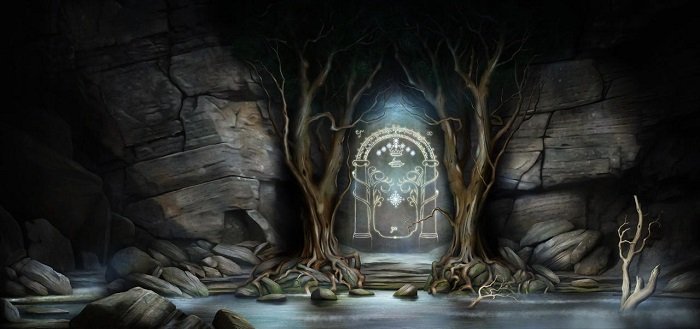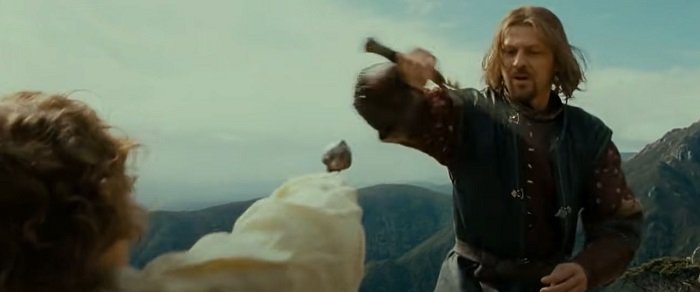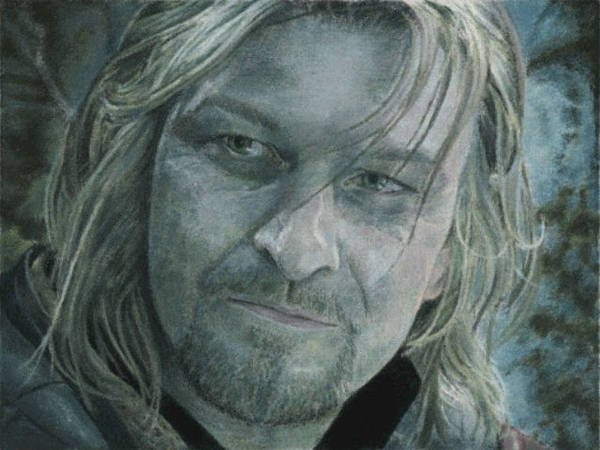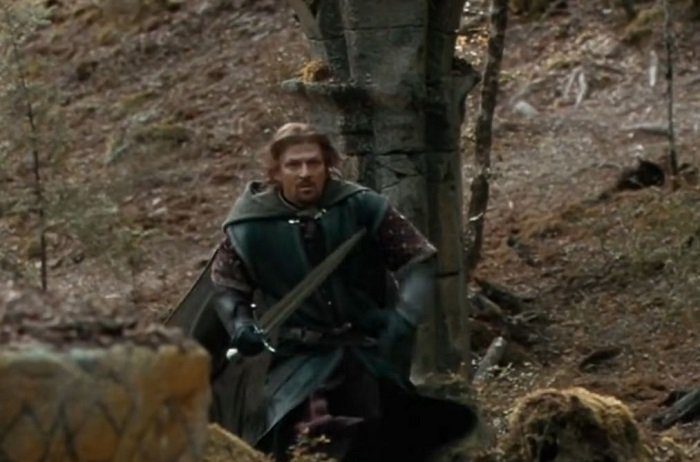'The Lord of the Rings' - Do I Prefer Boromir in the Book or the Film?
Before I start, as always, be aware this post contains SPOILERS.
As with most of the characters in ‘The Lord of the Rings’, Boromir’s portrayal in the book differs to how he is in the film.
His character is probably one of the least developed, and the reason could be because he only appears in ‘The Fellowship of the Ring’.
Yet, Tolkien gives us enough of an idea of the kind of man Boromir was, mainly through the eyes of other characters.
Boromir’s pride in his people and his heritage is clear when he speaks at the Council of Elrond:
“Believe not that in the land of Gondor the blood of Númenor is spent, nor all its pride and dignity forgotten…”
And when Aragorn asks Boromir if he wishes for the House of Elendil, namely Aragorn himself, to return to the Land of Gondor, Boromir answers proudly,
“I was not sent to beg any boon, but to seek only the meaning of a riddle… Yet we are hard pressed, and the Sword of Elendil would be a help beyond our hope – if such a thing could indeed return out of the shadows of the past.”
After the Ring is revealed and everyone is brought up to speed with regards to Gollum’s escape from the Mirkwood elves, and of Saruman’s betrayal, Boromir speaks his mind, believing they can use the Ring to their advantage:
“The Men of Gondor are valiant, and they will never submit; but they may be beaten down. Valour needs first strength, and then a weapon. Let the Ring be your weapon, if it has such power as you say. Take it and go forth to victory!”
But Elrond firmly states that none can use the Ring for it “is altogether evil. Its strength… is too great for anyone to wield at will… The very desire of it corrupts the heart.”
Even though he has his doubts about destroying the Ring, Boromir accepts the decision, and accepts Aragorn as the wielder of the Sword-that-was-Broken even though Aragorn’s return will affect Boromir’s status as the son of the Steward:
“So be it… Then in Gondor we must trust to such weapons as we have. And at the least, while the Wise ones guard this Ring, we will fight on. Mayhap the Sword-that-was-Broken may still stem the tide – if the hand that wields it has inherited not an heirloom only, but the sinew of the Kings of Men.”
When it’s being decided who will be in the company to accompany Frodo, Aragorn wants Boromir to be included, stating, “He is a valiant man.”
‘Council of Elrond’ by NachoCastro (DeviantArt)
A good example of Boromir the warrior is shown when the company sets off from Rivendell and he blows his war-horn only to be admonished by Elrond, to which he replies:
“But always have I let my horn cry at setting forth, and though thereafter we may walk in the shadows, I will not go forth as a thief in the night.”
One thing Boromir excels at is giving good advice, even though its seldom heeded.
In Hollin, before they head to the pass of Caradhras, Boromir recommends that “… each of us should carry a faggot of wood, as large as he can bear” for he “was born under the shadow of the White Mountains and know something of journeys in the high places. We shall meet bitter cold…”
In the book, the two instances when Boromir’s advice was ignored led to loss in Moria and delay in Lothórien.
Obviously, in the big scheme of things, the loss of Gandalf in Moria worked out, but, at the time, the company did not know that.
‘The Doors of Moria’ by jeshannon (DeviantArt)
When Gandalf suggests going through Moria, Boromir is adamant against the idea, stating Moria “is a name of ill omen…” and he proposes going south until “we come to the Gap of Rohan, where men are friendly to my people…”
But Gandalf won’t take the Ring anywhere near Saruman and Isengard.
Gimli is the only one happy to go to Moria with Gandalf; even Aragorn is reluctant, not wishing “to enter Moria a second time”, and the others don’t want to, either.
But, in the end, they agree to follow Gandalf to the mines.
Boromir’s uneasiness concerning Lothlórien was because of the cautionary tales of his people who believed the place to be perilous.
However, when Aragorn says there’s no other way but to go through Lothlórien, Boromir puts aside his misgivings and follows.
If I remember correctly, the company end up staying there about a month.
Even though no reference is made to it, I wonder how much Boromir’s worry for his people and Minas Tirith weighed on him.
All the while, the Ring was within easy reach of him; how much was it preying on his fears, and his desire to do good, his desperation to save his people?
Yet, Boromir remained steadfast in holding to his promise to the Fellowship; “The Men of Minas Tirith are true to their word.”
When they leave Lothlórien, more than once Boromir speaks of going to Minas Tirith, but each time concedes to Aragorn’s decisions.
Until they’re discussing which route to take once they get to Tol Brandir (Tindrock) and Amon Hen.
‘The Argonath’ by Kerim-b (DeviantArt)
Boromir is all for getting off the river and making their way west and south to his lands, but Aragorn argues they haven’t decided yet if they’re going to Minas Tirith, and he wishes to “stand in [the high seat upon Amon Hen] before I decide my further course…”
Boromir continues to argue against this choice until he realises Aragorn is the one Frodo will follow:
“It is not the way of the Men of Minas Tirith to desert their friends at need,” he said, “and you will need my strength, if ever you are to reach the Tindrock. To the tall isle I will go, but no further. There I shall turn to home, alone if my help has not earned the reward of any companionship.”
‘Boromir and Frodo on Amon Hen’ by peet (DeviantArt)
At Amon Hen, Boromir approaches Frodo who has walked off to be alone with his thoughts and asks if they can talk awhile for it would comfort him, but Frodo doesn’t think any words will help for he knows what he should do, “but I am afraid of doing it, Boromir: afraid.”
Boromir says he only wishes to help him and offers his counsel, but Frodo talks of his heart warning him:
“Against delay. Against the way that seems easier. Against refusal of the burden that is laid on me. Against – well, if it must be said, against trust in the strength and truth of Men… I do not doubt the valour of your people… The walls of Minas Tirith may be strong, but they are not strong enough. If they fail, what then?”
Interestingly, Boromir still believes in hope:
“We shall fall in battle valiantly. Yet there is still hope that they will not fail.”
They talk of the Ring and Boromir gets annoyed when Frodo repeats what Elrond said at the Council, that they cannot use the Ring.
Boromir believes Frodo is simply parroting what others have said instead of listening to his own good sense, and then speaks his mind:
“True-hearted Men, they will not be corrupted. We of Minas Tirith… do not desire the power of wizard-lords, only strength to defend ourselves… in our need chance brings to light the Ring of Power. It is a gift, I say; a gift to the foes of Mordor. It is mad not to use it, to use the power of the Enemy against him. The fearless, the ruthless, these alone will achieve victory…”
He tries, one last time, to get Frodo to give him the Ring, and when the hobbit refuses, finally gets angry and tries to wrest it from him.
But Frodo manages to elude him and, in desperation, puts the Ring on and runs from Boromir.
Shouting, Boromir accuses the invisible Frodo of wanting to take the Ring to Sauron, then ‘catching his foot on a stone, he fell sprawling and lay upon his face. For a while he was… still… then suddenly he wept.
He rose and passed his hand over his eyes, dashing away the tears. “What have I said?” he cried. “What have I done? Frodo, Frodo!” he called. “Come back! A madness took me, but it has passed. Come back!”’
When Aragorn demands to know what transpired between Boromir and Frodo, Boromir only says that he tried to persuade Frodo to go to Minas Tirith, and when the hobbit refused, Boromir grew angry, and Frodo must have put the Ring on for he vanished.
‘The Two Towers’ opens with ‘The Departure of Boromir’.
But we don’t see what actually happens to Boromir, for it is from Aragorn’s point of view and the first he knows of the danger is when he hears the horn:
‘“The horn of Boromir!” he cried. “He is in need!”’
‘Boromir’ by NachoCastro (DeviantArt)
And when Aragorn finds Boromir, he’s already near death…
‘He was sitting with his back to a great tree, as if he was resting. But… he was pierced with many black-feathered arrows; his sword was still in his hand, but it was broken near the hilt; his horn cloven in two was at his side. Many Orcs lays slain, piled all about him and at his feet.’
Boromir confesses what he did to Aragorn:
‘“I tried to take the Ring from Frodo,” he said. “I am sorry. I have paid…They have gone: the Halflings: the Orcs have taken them. I think they are not dead. Orcs bound them.” He paused and his eyes closed wearily. After a moment he spoke again. “Farewell, Aragorn! Go to Minas Tirith and save my people! I have failed.”
“No!” said Aragorn, taking his hand and kissing his brow. “You have conquered. Few have gained such a victory. Be at peace! Minas Tirith shall not fall!”
Boromir smiled… did not speak again.’
It is only later, through Pippin’s recollection, that we learn of the manner of Boromir’s death.
As the story progresses, we learn yet more of the honourable, valiant man he was through the words of others.
When Aragorn, Legolas, and Gimli meet the riders of Rohan, Aragorn tells Éomer of the death of Boromir, and the latter’s response speaks volumes when he calls one who was not of their people a worthy man and great captain:
‘“Great harm is this death to Minas Tirith, and to us all. That was a worthy man! All spoke his praise. He came seldom to the Mark, for he was ever in the wars on the East-borders; but I have seen him. More like to the swift sons of Eorl than to the grave Men of Gondor he seemed to me, and likely to prove a great captain of his people when his time came…”’
And Gandalf’s response on learning of the passing of Boromir:
‘“Poor Boromir! I could not see what happened to him. It was a sore trial for such a man: a warrior, and a lord of men. Galadriel told me that he was in peril. But he escaped in the end. I am glad…”’
It seems Gandalf suspected the growing temptation Boromir must have been constantly fighting and yet, in the end, he conquered it and escaped with his honour and goodness unsullied.
And let’s not forget how much the hobbits, especially Pippin, liked Boromir, and that is made apparent in ‘The Return of the King’:
‘Pippin had liked [Boromir] from the first, admiring the great man’s lordly but kindly manner…’
‘Denethor’ by KaraMalikova (DeviantArt)
When Denethor wanted to know how Boromir had met his end, it was Pippin who told him, and Pippin who offered his service in memory of one so brave:
‘“The mightiest man may be slain by one arrow… and Boromir was pierced by many… I honour his memory, for he was very valiant. He died to save us, my kinsman Meriadoc and myself… and though he fell and failed, my gratitude is none the less…
“Little service… will so great a lord of Men think to find in a hobbit… yet such as it is, I will offer it, in payment of my debt.”’
Boromir played by Sean Bean
Now, what about Boromir in the films?
As in the book, the first we see of him is when he arrives at the Council of Elrond.
He doesn’t seem that respectful when he handles the shards of Narsil, and, during the Council, Boromir doesn’t appear to care much for the presence of Aragorn when he’s told his identity.
So far, it’s Boromir’s arrogance that’s taking centre stage.
Until the Council decides the Ring is to be taken to Mount Doom to be destroyed.
Even though he’d been tasked by his father, Denethor, to bring the Ring back to Minas Tirith, and his disappointment shows, Boromir doesn’t argue, saying instead: “If this is indeed the will of the Council, then Gondor will see it done.”
At last we see the honourable side of Boromir even though upholding the will of the Council means defying his father.
Once the Fellowship is on the road, the film does a good job showing Boromir’s caring nature while not making him soft and sympathetic.
His interactions with the hobbits, namely Merry and Pippin, underlines the characteristic of a good officer who respects and cares for others.
He takes the time to train the hobbits, has a good laugh with them, speaks up for their safety in the deep snow of Caradhras, and in Moria.
Boromir training the hobbits
When Gimli is mourning Balin’s death in Moria, it is Boromir who places his hand on the dwarf’s shoulder in a gesture of comfort.
On the outskirts of Lothlórien, Boromir speaks comforting words to Frodo who is very much feeling Gandalf’s loss:
“Gandalf’s death was not in vain. Nor would he have you give up hope. You carry a heavy burden, Frodo. Don’t carry the weight of the dead.”
In Lothlórien, Boromir tells Aragorn of what Galadriel had said when he heard her voice in his head, speaking of Denethor and the fall of Gondor yet she said there is still hope.
For his part, Boromir doesn’t feel any hope; he speaks of his father’s rule failing and the people losing faith, of how he’s expected to make things right, and his desire to restore the glory of Gondor.
He then speaks of the White City, and we see his pride in his home, also his acceptance of Aragorn as a lord, if not king, of Gondor.
‘Son of Gondor’ by The-Wizard-of-Art (DeviantArt)
Yet, once the Fellowship leaves Lothlórien, Boromir’s struggle against the Ring becomes more obvious, culminating in his angry attempt to forcibly take the Ring from Frodo.
As swiftly as in the book, Boromir is filled with regret and shame at his actions.
The film shows us, in ‘present time’, Boromir’s last moments.
When he comes racing to defend Merry and Pippin, it is exactly as Tolkien wrote it:
‘Then Boromir had come leaping through the trees…’
Boromir leaping through the trees…
His battle with the Orcs is unbelievably heroic right up to and beyond the moment the first hideous, black-feathered arrow strikes him.
He’s on his knees, then gets right back up and continues fighting, only to be struck again and a third time.
That he looks death in the eye without flinching, again, says a lot about his courage.
When Aragorn comes to him as he lies dying, his first words aren’t about himself but about Merry and Pippin – “They took the little ones.”
Boromir confesses to Aragorn that he tried to take the Ring from Frodo, that he’s failed them all, and the world of Men will fall.
But Aragorn assures him he fought bravely and kept his honour; he promises Boromir, “I will not let the White City fall nor our people fail.”
And those words give Boromir, in his last moments, hope as he repeats, “Our people. Our people.”
Boromir’s last moments…
Its almost as if a light comes over his features as he reaches for his sword and holds it to his chest before saying to Aragorn, “I would have followed you, my brother. My captain. My king.”
So, do I prefer the character of Boromir in the book or the film?
Overall, while there are aspects I like in both, I tend a little more towards the book version only because the passage of time underlines just how much Boromir resisted the lure of the Ring.
Despite the lack of character development in the books, I still think we get a good idea of the sort of man Boromir was – an honourable soldier and good leader, loyal, strong-willed, dutiful, and proud with a touch of arrogance, but with a good heart.
He had doubts and fears, but he did his best not to let them overwhelm him; at the end of the day, it was the constant proximity of the Ring that wore him down, making him act of out character for he didn’t desire power, only the strength to protect his people and his city.
Boromir only began to succumb to the power of the Ring as they got to Amon Hen.
That he spent quite a while talking to Frodo, trying to reason with him and persuade him to lend him the Ring, shows his self-control even as the Ring exerted its influence over him.
When he did try to take it, he didn’t draw his sword to kill Frodo, which he could have easily done, but attempted to wrestle it from him; compare that to how quickly Smeagol killed Deagol for the Ring.
‘Boromir’ by evankart (DeviantArt)
The reason I keep banging on about the strength of Boromir’s character is because of how easily Men, especially, succumbed to the influence of the Ring.
In the Fellowship, there was Aragorn who was of Númenorean descent, who was more able than most men to withstand the Ring’s influence; Gandalf, a Maia, more able to resist its influence; Legolas, an Elf, another race who had a greater resistance compared to men; Gimli, a Dwarf; while dwarfs in general were not affected by the Rings of Power, it did seem to make them more acquisitive; and the Hobbits who, despite their small stature, were said to have a special resistance to the corrupting influence of the Ring although constantly being in its presence would eventually wear them down too.
Taking all that into account, Boromir’s restraint was nothing short of phenomenal.
Having said I lean ever so slightly more towards the book version of Boromir, there is one scene from the film that stands out as my absolute favourite – Boromir’s last stand and his dying moments.
Sean Bean is one hell of an actor, and with little to no dialogue during the fight, only his expressions and body language, he conveyed Boromir’s heroism and courage.
And Boromir’s dialogue as he lay dying and, again, his expression and body language, gave this character a magnificent final moment, one that stays in the memory a long, long time.
I’ll end with the ‘Lament for Boromir’, a beautiful, poignant piece which, in the book, was sung by Aragorn and Legolas at Boromir’s funeral; here, performed by Clamavi de Profundis.












